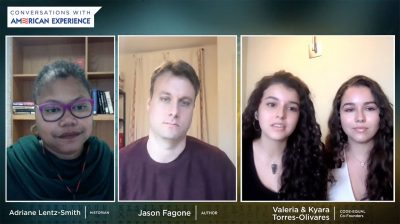Elizebeth Friedman, known as the country’s first female cryptanalyst, was an essential leader in her field — even uncovering a secret Nazi spy ring in World War II. And yet, few people remember her name.

Friedman’s story raises an important question: who else are we missing?
PBS’ American Experience hosted an online conversation titled “Breaking The Code: A History Of Women In STEM” Thursday, inspired by its newly released film, “The Codebreaker.”
The discussion focused primarily on Friedman’s pioneering accomplishments in her field, and how being a woman in STEM has changed since the 1940s.
Featured guests of the event included Jason Fagone, a journalist at The San Francisco Chronicle and author of “The Woman Who Smashed Codes,” which the film is based on.
Fagone said he became a “superfan” of Friedman’s story after reading about her husband, William. William is considered one of the greatest codebreakers of all time, yet his wife introduced him to the craft.
“In reading about this famous man, there was a mention of his wife,” Fagone said at the event. “Seemed like she had a very interesting life of her own, maybe even a more interesting life than the life of her husband, but I couldn’t find any information about her.”
Guest speaker Valeria Torres-Olivares, co-founder of CODE-EQUAL, a non-profit that provides self-identifying girls and minorities with free computer science education, said she was surprised she hadn’t learned about Friedman before, given the impact she had.
“It was also just a little bit shocking and almost sad that we hadn’t learned about her in history classes or even computer science classes when we first were discussing and learning about cryptology,” Torres-Olivares said at the event. “I wish I had.”
Moderator Adriane Lentz-Smith, a Duke University associate professor of history and African & African American studies, said the film showcases Freidman’s encounters with sexism in the industry.
“As the [movie] clip shows us, newspaper accounts of Elizebeth’s testimony focused on her physical appearance as much as, if not more than, her stunning work,” Lentz-Smith said. “Reporters were too busy marveling at her gender to… credit her analytical brilliance.”
Kyara Torres-Olivares, sister to Valeria and fellow co-founder of CODE-EQUAL, said Friedman’s story resonated with her, particularly a scene in the movie when Friedman has to defend herself against attorneys.
When Kyara Torres-Olivares switched from first coding in an all-girls environment to one that was not, she found the experience was not as supportive.
“It kind of reminded me of the ways that girls today have to stand up for themselves when they’re pursuing STEM fields,” she said at the event. “It isn’t always easy sitting in a class of 30 students and being the only girl, because you sometimes… feel unheard and unseen.”
Some say the experience of these women from Friedman’s time is no different from today. Isabelle Deng, a College of Arts and Sciences freshman majoring in neuroscience, said women are often a minority in her science classes, particularly at her STEM-focused high school.
“Especially for the higher-level STEM classes, I noticed a lot of the time, there’d be maybe four girls in the class,” Deng said in an interview, “and the rest would be guys.”
She said in her experience, this unbalanced ratio can often make it “isolating” for women in STEM fields, who can feel excluded from the “bro code” of male-dominated classes.
Deng also said sexism has been evident in her STEM courses, where certain men treated the femme-presenting people in the class differently.
“I’ve definitely had my share of experiences with guys who… treat girls differently,” Deng said. “They can come off as condescending I would think, or they just don’t believe that you can know as much, or you’re as capable as them.”
Conversely, Sofia Wyszynski, a junior in CAS studying biology, said the balance between men and women in classes tends to vary.
However, she said the majority of professors in her department are men. Though Wyszynski said she personally feels lucky to have had a female biology professor who has become her mentor, she knows that experience is not unanimous for every woman in the major.
“I can understand how some other students feel like it’s hard to find female mentors,” Wyszynski said in an interview. “And then maybe it’s harder to connect in that way.”
When asked how more women can be encouraged to pursue STEM, Wyszynski said it’s important to stress at a young age that science is a tangible option for them.
“I definitely think you have to start early and you have to show girls that you can be a doctor or you can be a scientist,” Wyszynski said. “[Show] girls you’re just as capable as a boy is.”


























































































































